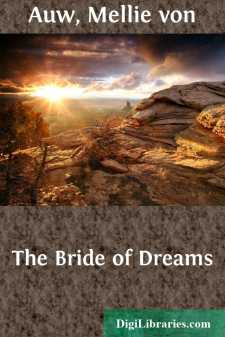Categories
- Antiques & Collectibles 13
- Architecture 36
- Art 48
- Bibles 22
- Biography & Autobiography 813
- Body, Mind & Spirit 142
- Business & Economics 28
- Children's Books 17
- Children's Fiction 14
- Computers 4
- Cooking 94
- Crafts & Hobbies 4
- Drama 346
- Education 46
- Family & Relationships 57
- Fiction 11829
- Games 19
- Gardening 17
- Health & Fitness 34
- History 1377
- House & Home 1
- Humor 147
- Juvenile Fiction 1873
- Juvenile Nonfiction 202
- Language Arts & Disciplines 88
- Law 16
- Literary Collections 686
- Literary Criticism 179
- Mathematics 13
- Medical 41
- Music 40
- Nature 179
- Non-Classifiable 1768
- Performing Arts 7
- Periodicals 1453
- Philosophy 64
- Photography 2
- Poetry 896
- Political Science 203
- Psychology 42
- Reference 154
- Religion 513
- Science 126
- Self-Help 84
- Social Science 81
- Sports & Recreation 34
- Study Aids 3
- Technology & Engineering 59
- Transportation 23
- Travel 463
- True Crime 29
The Bride of Dreams
by: Mellie von Auw
Description:
Excerpt
As one approaches my little city from the sea on a summer's day, one sees only the tall, round clump of trees on the ramparts and, overtopping it, the old bell-tower with its fantastically shaped and ornamented stories and dome-top of deep cobalt blue. The land to either side is barely visible, and the green foliage flooded with pale sunshine seems to drift in the sun-mist on the grayish yellow waters. It is a dreamy little town, that once in Holland's prime had a short-lived illusion of worldly grandeur. Then gaily-rigged vessels embellished with gilded carvings and flaunting flags entered the little harbor, fishing boats, merchant vessels and battleships. The inhabitants built fine houses with crow-stepped gables and sculptured façades and collected in them exotic treasures, furniture, plate and china. Cannon stood on the ramparts and the citizens were filled with a sense of their importance and power as people of some authority in the world. They bore an escutcheon and were proud of it, they had their portraits painted in gorgeous attire, they gave the things their terse and pretty names, and they spoke picturesquely and gallantly as befits people leading a flourishing elemental life.
Now all this is long past. The little city no longer lives a life of its own, but quietly follows in the wake of the great world-ship. In the harbor a few fishing smacks, a market ship, a couple of sailing yachts and the steamboat are still anchored. The fine houses are curiosities for the strangers, and the china, the furniture and paintings may be viewed in the museum for a fee.
There is order, and peace, and prosperity too; the streets and houses look clean and well kept. But it is no longer a vigorous personal life; the color and the bloom have faded, the splendor and pageant are gone. It still lives, but as an unimportant part of a greater life. Its charm lies only in the memory of former days. It is lovely through its dream life, through the unreal phantasy of its past. All that constitutes its charm - the dark shadowy canals reflecting the light drawbridges, the pretty quaintly-lighted streets with the red brick gables, bluish gray stoops, chains and palings, the harbor with the little old tar and rope shops, the tall sombre elm trees on the ramparts - it all possesses only the accidental beauty of the faded. It can no longer, like a young and blooming creature, will to be beautiful. It is beautiful involuntarily, no longer as a piece of human life, but as a piece of nature. And its loveliness is pathetic through the afterglow of a brief blazing up of individual vivid splendor of life.
In this quite sphere, where life now flows on but lazily and reflectively as in a small tributary stream of, the great river, - I live, an old man, for the accomplishment of my last task.
I live obscurely amid the obscure. I do my best to escape notice, and have no notoriety whatsoever, not even as an eccentric.
I associate with the doctor and the notary is expected of me, and I also go to the club. It is known that I have an income and, besides, earn some money from a small nursery on the outskirts of the town, and by giving Italian lessons.
The rumors regarding my past have all quieted down, and people have grown accustomed to my foreign name - Muralto. They see me regularly taking the same walk along the sea dike to my nursery, and my gray felt hat and my white coat in summery weather are known as peculiarities of the town. When you read this, reader, I shall be buried, respectably and simply, with twelve hired mourners and the coach with black plumes of the second class, and a wreath from the burgomaster's wife, to whom I gave lessons; from the notary, who occasionally earned something through me; and from the orphanage because, as treasurer, I always kept the accounts in order.
This is as I wish it to be. When you read this my living personality may no longer stand in your way. My individual being may no longer engage your attention. I know how this would veil the truth for you. Never has man accepted new and lucid ideas from a contemporary unless he were an avowed and venerated prophet, that is to say, a man corrupted and lost. I will not let myself be corrupted and give myself up as lost, and yet I know that my thoughts are too great to be accepted from free conviction without slavishness by my living fellow-men....


